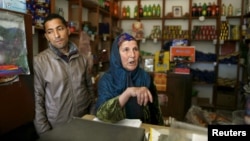An International Monetary Fund team visits Tunisia this week to negotiate a new credit line for a government hit by collapsing tourism revenues, unemployment, militancy and social unrest.
Five years after overthrowing autocrat Zine El Abidine Ben Ali and sweeping in democratic change, Tunisians are still struggling with an economy unable to deliver the jobs and reforms their revolution promised.
Three major militant attacks last year, including two on foreign visitors, have battered the tourism industry, while a week of rioting last month exposed the social tensions over jobs and living conditions across the country.
European countries which praised Tunisia as model for democratic transition now worry about how to protect a country that has been one the few success stories in a region struggling with violent fallout from the 2011 revolutions.
Ahead of the IMF mission, the French government offered Tunisia one billion euros over five years and the European Union said it would lend 500 million euros to cope with the economic difficulties through 2017.
Tunisia still role model
"It is more important than ever that Tunisia remains an example for the region. The political transition Tunisia has engaged in has faced many economic challenges since 2011," EU commissioner for economic affairs Pierre Moscovici said.
The IMF delegation starts its visit to Tunisia on Thursday for talks on a new credit program likely to be worth at least $1.7 billion, a Tunisian official said this week.
That follows a two-year deal totaling about $1.74 billion that was agreed in 2013 and extended last year by seven months to buy time for Tunisia to enact banking and fiscal reforms.
Under the program, Tunisia had agreed to follow certain economic polices, such as keeping its deficit under control and making the foreign exchange market more flexible.
But if its political transition has been held up as a model with free elections and a modern constitution, Tunisia's economic route has lagged behind, marked by continued high public spending and slow progress in promised reforms.
A political crisis in the ruling Nidaa Tounes party, that has split the party and allowed Islamist party Ennahda to become the most powerful faction in parliament, also risks slowing the progress of reforms.
Last year, the economy grew just 0.8 percent compared with 2.3 percent in 2014, mostly because of the militant attacks on the Tunis Bardo museum and a Sousse beach resort hotel, both targeting foreigners, and protests hitting phosphate exports.
‘Catastrophe’ year
Tourism provides around seven percent of Tunisia’s gross domestic product and is a key job supplier. Foreign visitors dropped by around one million last year, a fall of 20 percent, after the attacks. Revenues from tourism fell 35 percent.
The local tourism federation has already dismissed 2016 as a "catastrophe" with the loss of clients following cancellations by large tour companies and some European governments warning against travel to Tunisia.
"The economy is in bad shape," one Western diplomat said. "They are getting lots of money out of Europe, but don't have the capacity to utilize this in an optimal fashion."
Protests that erupted last month over jobs in towns across the country were a reminder of the fragile social peace that threatens the country with 700,000 unemployed nationwide, including 250,000 university and college graduates.
The government has since said it will hire 23,000 in the public sector and 50,000 in the private sector, as well as providing guarantees for start-up projects for graduates.
No ‘magic wand’
But some analysts dismissed those as unrealistic attempts to calm tensions with welfare-style spending at a time when the government can little afford it, rather than the structural reforms that Tunisia needs, especially to public spending.
"They say they don't have a magic wand to make things
better, but in just a few days they presented measures that will have serious implications for the budget," said local economist Radhi Meddeb. "This is just populist measures not logic."
International lenders are looking for a reduction in public wage spending and budget deficit, restructure in banking and reform of tax and investment codes. All that could improve investor confidence, as long as there were no major security or political upsets.
But Moody's investor service said last month that political infighting and the threat of militant attacks would hinder the government from advancing in its economic program.
"We expect the political tensions and the primary focus on national security to distract policy further from the structural economic reform agenda," it said. "This risks minimal progress on important initiatives agreed with the IMF."





